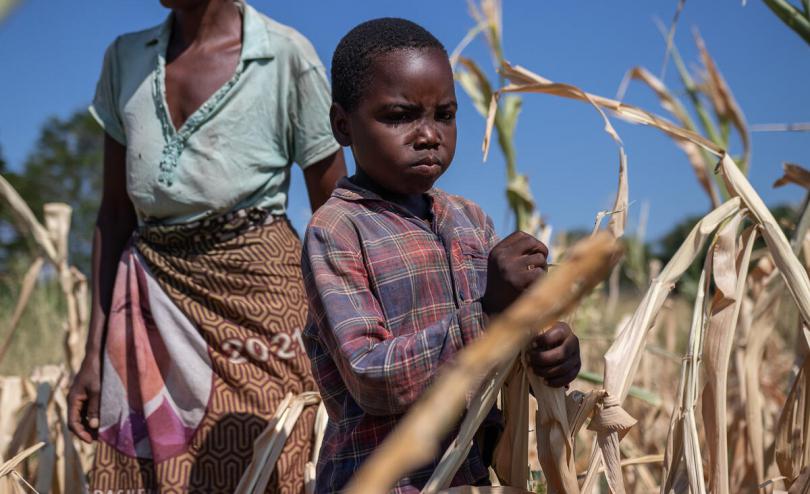“We go to sleep hungry”: Children surviving on boiled waterlily roots and wild fruits as drought devastates 50% of Zambia’s food crops

Lawrence, 7, in a field of failed crops. Photo by Sacha Myers/Save the Children. More content available here
Multimedia content available here
LUSAKA, 3 April, 2024 –Zambia’s crippling drought, the worst its seen in at least 20 years, is leading to widespread food shortages with some children forced to survive on a single daily meal of boiled waterlily roots, nuts and wild fruits, said Save the Children.
Seven out of 10 provinces in Zambia have been impacted by the intense drought, with the El Niño induced dry spell killing crops and drying up water sources. The government has declared the situation a national emergency, with more than 1 million children facing severe food shortages.
Rains have failed in Zambia for nine weeks consecutively at a time when farming families needed it most, with almost half of the nation’s planted area destroyed, according to the Zambian President. Farming families are particularly hit hard by the changes in weather patterns, as they depend on rain to support the production of maize, the country’s principal food crop and have lost one million hectares (2.5 million acres) from 2.2 million planted crops due to the influence of El Nino on the 2023-2024 rainy season,
A combination of factors including limited humanitarian funding, double digit inflation rate, and skyrocketing food and commodity prices are exacerbating the food crisis in Zambia, with mothers in rural areas telling Save the Children they are unable to feed their children and fear for their lives.
Nine-year-old Namushi lives in Zambia’s Western Province with her grandmother Mafelelezo, 55, her two sisters and cousins. Her mother is unwell, so Mafelelezo takes care of Namushi and her sisters. The current drought has left the extended family – who survive by farming a small area of land – in a desperate search for food each day.
Namushi told Save the Children that hunger is the most challenging part of her day and that she doesn’t have the desire to play when she’s hungry.
She said: “The crops have all dried up compared to last year. It’s due to poor rainfall. When I see this, I feel hungry. We eat once a day. We eat the mashwa (waterlily root). We eat it boiled.
“When I’m hungry I don’t have the desire to play. I feel hungry at school. At times I feel like collapsing due to hunger. Last year things were a little better and there was food.”
Seven-year-old Lawrence also lives in the Western Province with his mother, Inonge, 38, his 13-year-old sister and grandmother. They are a closely-nit family who rely on growing their own food to survive but the current drought has left the family with very little to eat.
Lawrence said: “There’s no rain. The maize has not grown well because of the hot sun. The food has been burnt by the sun. I feel bad. Sometimes we only eat once [a day]. Sometimes we go to sleep hungry. I feel bad when there’s no food to eat.”
Sitting across from Lawrence, his mother said:
“When my children miss meals and sleep on an empty stomach, you would think they are sick from the way they look. When we get food, and they eat a little food, then they start playing around and you realise it’s just the hunger that makes them sleep. When they’re hungry, they’re not energetic, they even look like they’re confused.”
“We’re asking the government to help us with food, so our children’s progress won’t be affected. If they give us food, we can prepare food for our children daily. When they’re well-fed, then they won’t fail to go to school, especially the little children. When they go to sleep on an empty stomach, they’ll fail to go to school.”
Save the Children said the El Niño weather phenomenon, which has brought the extreme drought, exacerbated by the climate crisis, is causing harrowing impacts for families and children in Zambia with delayed response.For a third year in a row, Zambia topped a list of the world’s underreported crisis in 2023 as other emergencies overshadowed the slow creeping yet catastrophic suffering and enormous needs in this large, peaceful country in Southern Africa.
Jo Musonda, Save the Children Country Director in Zambia, said:
“Many hard-hit families are being forced to take desperate measures to cope with the crisis, such as reducing their daily meal intake, selling off livestock and foraging for hours each day for wild fruits, roots and nuts. Children report feeling dizzy from hunger and find it hard to concentrate during class, sometimes forcing them to skip days of school each week.
“Access to clean water is huge problem as some streams, wells and flood plains have dried up and people often travel hours each day to collect water. Some families report digging shallow holes in the ground to find water when their traditional water source runs dry.
“We are calling for urgent national and international action and funding to provide families and children with basic services including food and water.”
Save the Children is calling for child-sensitive government interventions such as introducing and scaling emergency school feeding programmes. Evidence from our previous interventions shows that this will guarantee a nutritionally balanced meal to vulnerable children across all drought-affected communities and ultimately will help combat stunting and malnutrition and boost school attendance and educational performance.
The organisations is initially responding to the drought crisis in Zambia by collaborating with the government of Zambia to assess the extent of the drought. We are further supporting the Disaster Mitigation and Management Unit in the distribution of relief maize in some of the affected areas. We will also be providing meals to school going children in the worst affected areas.
Save the Children has been working in Zambia for 40 years, running health, nutrition, education, and protection programmes across the country.
ENDS
Multimedia content available here
For further enquiries please email:
Delfhin Mugo, Delfhin.Mugo@savethechildren.org;
Daphnee Cook, Daphnee.Cook@savethechildren.org;
Our media out of hours (BST) contact is media@savethechildren.org.uk / +44(0)7831 650409
Please also check our Twitter account @Save_GlobalNews for news alerts, quotes, statements and location Vlogs.




